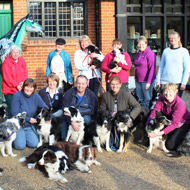Owners attending Border Collie Day contributed to the glaucoma research by allowing their dogs to have eye examinations and cheek swabs.
Research aims to develop DNA test to identify 'at risk' dogs
A six-year study to try and prevent glaucoma from occurring in dogs has been launched by the Animal Health Trust (AHT).
The new research aims to develop a DNA test to identify dogs at risk of developing inherited glaucoma. The researchers say that by removing 'at risk' dogs from the breeding population, the prevalence of glaucoma could be drastically reduced over time.
If successful, the DNA test could benefit a number of popular dog breeds including border collies, golden retrievers, cocker spaniels, English and Welsh springer spaniels and basset hounds.
In order to better understand inherited glaucoma, the AHT is collecting DNA samples in the form of a cheek swab from dogs diagnosed with glaucoma, dogs diagnosed with goniodysgenesis, and dogs over the age of five clear of goniodysgenesis.
Through the research, geneticists at the AHT hope to make significant steps towards identifying the mutation(s) responsible for goniodysgenesis in different breeds.
The project was launched during World Glaucoma Week (8-14 March). On Friday 13, 52 border collies and their owners travelled to the AHT's Newmarket site to attend Border Collie Day, where talks were held to explain more about the different research projects currently being conducted by the AHT in the breed, including glaucoma and epilepsy.
The owners contributed to the glaucoma research, greatly boosting the sample numbers from border collies, by allowing their dogs to have eye examinations and cheek swabs.
Dr. Cathryn Mellersh, who is leading the research, said: "The Border Collie Day was a great success and really helped us to spread awareness of canine inherited glaucoma, which is a problem not enough dog owners are aware of. It's heartbreaking to see dogs go blind and have to have eyes removed due to this sudden and aggressive form of the disease.
"There is a lot of research ahead of us but, with enough support from dog owners and breeders, like those who attended the Border Collie Day, we hope to be able to make a difference and develop a simple DNA test to quickly identify which dogs possess the genetic abnormality responsibility for this condition. If we can achieve that, then hopefully, in the future, fewer dogs will suffer from this painful and blinding disease."
Co-researcher and veterinary ophthalmologist, James Oliver, added: "Most of the breeds we’re investigating for glaucoma are on the BVA/KC/ISDS Eye Scheme for hereditary eye diseases which advises screening for goniodysgenesis before breeding.
"Goniodysgenesis is an abnormality affecting the drainage pathway of the eye and is known to be significantly associated with glaucoma. However, we’ve learnt that goniodysgenesis can be progressive with age, so screening a young dog may not be conclusive enough. That’s why a genetic test would be ideal and would have a much greater impact on reducing the number of dogs affected by glaucoma in the future.”
Owners of border collies, flatcoated retrievers, Welsh springer spaniels, cocker spaniels, American cocker spaniels, English springer spaniels, basset hounds, golden retrievers, leonbergers and dandie dinmont terriers who fit the criteria are able to help the research by consenting to eye examination and submitting DNA samples from their dogs.
For more information about the research and the breeds affected, visit www.aht.org.uk/giftofsight.
Image (C) Animal Health Trust







 The latest
The latest 
